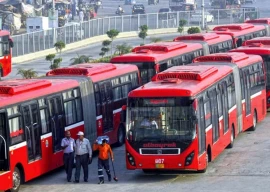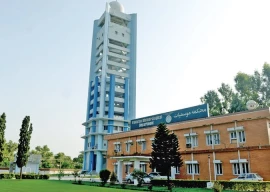
Countries like Thailand as well as Muslim countries like Malaysia and Indonesia have turned away from any help which is a shame given that these countries are doing well economically. Indonesia has allowed a trickle into Aceh province but has now closed the doors. The question now is where will these poor souls end up?
Pakistan has its share of Rohingyas, who have come here over the years, initially for economic reasons, and later fleeing violence in their home state.
There is a Burmi Colony in Karachi and other places where Muslims from the Arakan (Rakhine) province can be found even today. But their contact with relatives back home has been restricted, with most only relying on word of mouth to know of how things have been shaping. And the news from back home is not good.
If there is one positive Pakistan can claim, it can possibly be that rarely has it turned back refugees, whether they came from India or later from other bordering countries like Iran and Afghanistan or from as far as Burma. The possible exception, of course, are the Biharis who have been dreaming of coming to Pakistan but remain stranded at camps in Bangladesh.
But we have suffered as a consequence of these actions. The Afghan refugee influx post-1979 has changed Pakistan forever. But to blame the Afghans for the ills in our society is an easy way to explain a complex problem. We see that refugees are made scapegoats everywhere.
Today Rohingyas are on the run as violence continues in Arakan state. But there are those who say that these refugees are not fleeing persecution but are economic migrants who have been put on boats by people smugglers and then abandoned.
Despite all odds, New York Times reporter Thomas Fuller, a former colleague of mine, has done an excellent job of tracing the journeys of these migrants. He reported from a boat in the Andaman sea and helped trace down some of the refugee boats, which had been at sea for some months. Conditions on these vessels were sub-human but this did not move the authorities in the countries where they arrived. An estimated 6,000 or more such migrants are stranded at sea in Southeast Asia.
Our paper commissioned a series on the Rohingyas in 2013 when reporter Mashiur Rehman went to visit the camps of these refugees in neighbouring Bangladesh. In his excellent reports, Mashiur Rehman told stories of men, women and children fleeing to Bangladesh but where they were not given refugee status. He wrote about the thousands who fled sectarian riots and how they lost everything only so that they could be alive.
The report recalled that Myanmar passed a law in 1982 that effectively rendered the Rohingya community stateless. Frequent waves of ethnic violence since 1991 pushed more than 250,000 Rohingyas into Bangladesh, where they continue to live in squalid, makeshift camps with little or no access to healthcare or education.
Our report also revealed that since 1992, the Bangladesh government has denied the UN High Commissioner for Refugees (UNHCR) permission to register the Rohingya refugees. They are still considered illegal migrants and are not entitled to the food relief provided by the World Food Programme. They are also denied access to basic healthcare and education provided by the UNHCR and its partner organisations.
The Bangladeshi government is determined to keep the aid to a bare minimum to avoid creating a ‘pull factor’. It has stopped prominent international aid organizations to cease assistance to refugees living in unregistered camps. The local police had also launched crackdowns to push back the Rohingyas into Myanmar. The state’s mistrust of the refugees trickled down to the local population, reported Mashiur Rehman, with locals believing that the refugees were behind rising petty crime in the area around the unregistered camps.
With all this talk of Pan-Islamism and humanity, it seems national interest and pragmatism reign supreme for countries of South East Asia. Is there a lesson for us in all this?
Published in The Express Tribune, May 18th, 2015.
Like Opinion & Editorial on Facebook, follow @ETOpEd on Twitter to receive all updates on all our daily pieces.


1725291011-0/Miss-Universe-Nigeria-Chidimma-Adetshina--(1)1725291011-0-165x106.webp)









1725083820-0/Untitled-design-(24)1725083820-0-270x192.webp)
1725096749-0/Untitled-design-(1)1725096749-0-270x192.webp)





COMMENTS (11)
Comments are moderated and generally will be posted if they are on-topic and not abusive.
For more information, please see our Comments FAQ